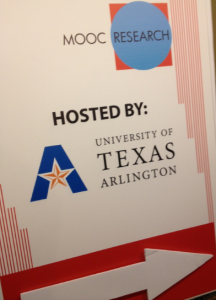News Story
KMi @ 1st MOOC Research Conference
Tuesday 17 Dec 2013
I recently joined several hundred researchers and practitioners in Arlington, TX, for the inaugural research conference on MOOCs. I joined an invitational pre-conference workshop, and spoke at a conference panel on "Certifying MOOCs", highlighting the role that learning analytics may play in assessing deeper learning at scale.
The MOOC Research Initiative (MRI), funded by the Bill & Melinda Gates Foundation, seeks to move from the hype around MOOCs with solid research. As the MRI website says:
"The dramatic increase in online education, particularly Massive Open Online Courses (MOOCs), presents researchers, academics, administrators, learners, and policy makers with a range of questions as to the effectiveness of this format of teaching and learning. To date, the impact of MOOCs has been largely disseminated through press releases and university reports. The peer-reviewed research on MOOCs has been minimal. The proliferation of MOOCs in higher education requires a concerted and urgent research agenda. The MOOC Research Initiative (MRI) will begin to address this research gap by evaluating MOOCs and how they impact teaching, learning, and education in general."
The list of projects funded under this programme is a great first start in placing MOOC design and evaluation on more solid ground, and includes the OU’s Martin Weller & Katy Jordan.
There were some inspiring keynotes and a fantastic closing panel, all replayable here. Several speakers throughout reminded delegates that MOOCs were originally conceived as a way for open learning to challenge conventional pedagogies, something that many do not realise, as mainstream universities have caught up with online learning, and appropriated MOOCs within a more conventional content delivery paradigm. While some people are upset by this development, in my view this is simply part of the natural process of media evolution, in which a new medium takes shape through intiially replicating existing media and practices, before it finds native forms. Remember, cinema started by pointing a camera at a theatre stage…
We should therefore be grateful for the oxygen of publicity that MOOC mania is currently giving to online learning as a serious modality, and to the deep questions now being asked around the value that institutions add to raw content and peer interaction.
In this spirit, my slides from the Certifying MOOCs panel sought to question exactly what kinds of learning we are trying to certify in MOOCs, the problem of authentic assessment, and the potential roles of learning analytics.
Certifying the Hard Stuff (and the role of learning analytics) from Simon Buckingham Shum
I’ve blogged a longer version of this report, plus an important strand on the role of theory in analytics.
Latest News
KMi’s report from SEMANTiCS 2025
KMi wins OU recognition of Excellence in Teaching Award
KMi experts present insights on Technology-Facilitated Gender-Based Violence to UN committee
KMi with a impactful presence at Open Repositories 2025
Alexander Mikroyannidis appointed International Expert in Distance Learning by A3ES

